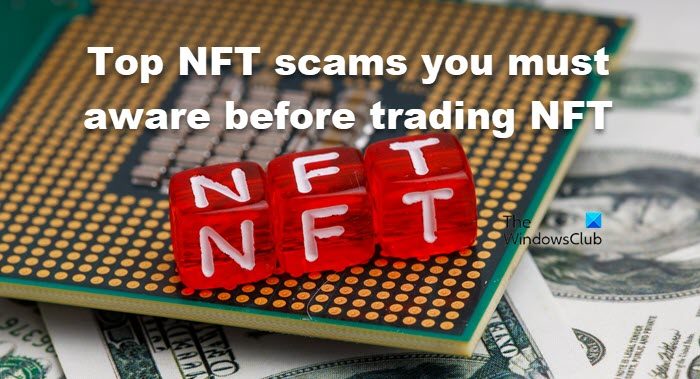NFT trading is quite an exciting world; however, it’s also a place full of scammers. Hence, it is crucial to know about potential scams that could affect digital investments. In this article, we’ll explore some of the top NFT scams that you must be aware of before trading to protect yourself and your assets. Whether you’re an experienced trader or just getting started, staying informed about these scams is essential for a safe and guilt-free NFT journey.

Why is NFT so popular?
NFTs have gained significant stardom in the world of arts, and it’s majorly due to new ways they offer to artists and creators to monetize their work. Now collectors can own and trade unique digital assets on a self-executing contract with predefined rules. However, the NFT marketplaces are subject to speculation, volatility, and potential scams, hence it’s necessary to learn about the thing you are getting into and tread with caution when dealing with NFTs.
Read: What does NFT mean and How to create NFT Digital Art?
Top NFT scams you must be aware of before trading NFT
Following are the top NFT scams you must be aware of before trading NFTs.
- Duplicated or plagiarised NFTs
- Ponzi schemes/Rug Pull scam
- Phishing scams
- Bidding scams
- Pump and Dump
Let’s talk about them in detail.
1] Duplicated or plagiarised NFTs

By the name, it’s quite clear what type of scam we are talking about, copying or reproducing already existing NFT, and of course without the owner or creator’s permission.
In these instances, the scammers either copy art or create NFTs similar to popular NFT collections. In the former scam, they take the digital files, which may be an image, video, or any other digital asset, and create a new NFT, claiming to own that content. This, obviously, infringes upon the intellectual property rights of the original content creator. Recently, there have been various such famous cases where artists have seen their work passed all over the Internet, ready for sale.
In the latter scam, investors are quite literally left in shambles as they are made to believe that they are purchasing something exquisite. To avoid duplicate or plagiarised NFTs, use reputable marketplaces that have mechanisms in place to verify creators and authenticate NFTs, as well as have policies that will back you up if stuck in such scenarios. Some known names are OpenSea, Rarible, and SuperRare. Don’t forget to verify authenticity, check the blockchain, ask questions, a lot of them, and last but not least, go with your guts.
2] Ponzi schemes/Rug Pull
The Ponzi scheme is exactly what you are thinking, promising high returns to investors by relying on new investors, but eventually, business starts dwindling due to less number of new investors. And at the end of this venture, unfortunate investors are left with nothing but the crumbs.
In Rug pull, scammers accumulate a collection of NFTs or create a new NFT project, advertising them through social media or online forums as highly valuable and rare assets that will outgrow their current value. To make this setup believable, scammers usually provide liquidity by adding tokens or funds to decentralized exchanges or marketplaces. Hence, to not be amongst the scammed people, it’s necessary to do your research, especially the authenticity, gain knowledge, and beware of unrealistic approaches.
3] Phishing scam
In this scam, scammers phish the information, and by this, we mean that individuals are deceived into revealing sensitive information. Scammers create fake NFT marketplace websites with convincing designs and logos or artist profiles closely mimicking the appearance of legitimate platforms or individuals. Various platforms, such as fake social media accounts, emails, and direct messages, are plotted to interact with potential victims.
More often than not, victims are provided with links claiming to provide a hefty sale; however, the moment a victim clicks on the provided links and enters its credentials, their information and security are in danger as scammers store this information. There’s also a chance of scammers asking for wallet addresses or private keys under the pretense of sending purchased NFTs. This information should never be shared as it can lead to the theft of cryptocurrency assets.
To avoid falling victim to phishing scams, always verify and double-check URLs, verify the authenticity of artists and sellers by cross-referencing their profiles and social media presence, use 2-factors authentication, and don’t hesitate to report suspected scams.
4] Bidding scams
In the NFT space, a bidding scam involves different fraudulent or misleading actions throughout the bidding or purchasing process. Scammers generally make a fake list of NFT postings and set low starting bids to create an environment of high demand and competition. They use shill bidding, i.e., making multiple accounts to artificially inflate the bid prices of their NFTs, which puts pressure on bidders. In some cases, scammers even delay or fail to transfer the NFT to the winning bidder.
It’s necessary to have thorough information on the NFT you are willing to purchase as well as checking the bidding history. Do your research, verify ownership, utilize a trustworthy marketplace, and be cautious with low starting bids. Also, it’s quite necessary to use secure payment methods.
5] Pump and Dump
Pump and Dump can be seen as another variety of bidding scams. However, the primary objective of a pump-and-dump NFT scam is to manipulate the price of a particular NFT and sell it at a profit before its prices collapse.
In this scam, scammers act in a group and buy a specific NFT in large quantities, thus increasing prices (pumping). Once the prices reach sky-high, they sell their holdings (dumping), causing the prices to plummet, leaving unsuspecting buyers who bought at the peak to suffer from losses.
In this scenario, buyers really need to make background checkups of the NFTs they are interested in to avoid getting scammed. Be cautious of investments based solely on hype and promises of quick profits, and squash buying into FOMO ( Fear of Missing out).
Read: How to protect your NFTs from theft or copies?
Why is NFT so popular?
NFTs have gained significant stardom in the world of arts, and it’s majorly due to new ways they offer to artists and creators to monetize their work. Now collectors can own and trade unique digital assets on a self-executing contract with predefined rules. However, the NFT marketplaces are subject to speculation, volatility, and potential scams, hence it’s necessary to learn about the thing you are getting into and tread with caution when dealing with NFTs.
Read: Top NFT marketplaces to launch and sell your NFTs
What should I do if I see a scam on NFT?
If you encounter a scam or suspicious activity, it’s important to take certain steps such as avoiding any type of interaction with them, capturing screenshots or record evidence of the scam, including the NFT listing, and any other relevant information, and reporting them to the platform. Most NFT marketplaces have reporting mechanisms to address scams and fraudulent activity so just look for a ‘Report’ or ‘Flag’ button to do the same. Educating yourself and others is key to avoiding falling prey to such scams. And if, unfortunately, you are stuck in a situation where a huge loss is impending, don’t waste time, and seek legal advice and involve higher authorities.
Read Next: How to access Blockchain Domains in a Browser.
Leave a Reply